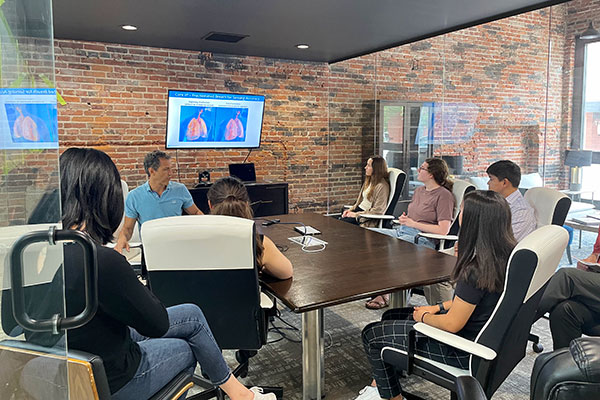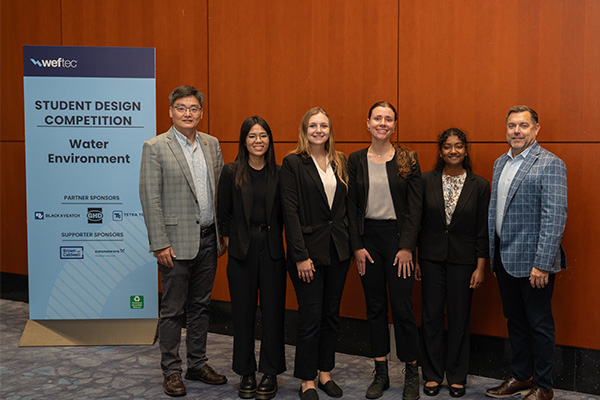BME internship program supports students, startups in St. Louis
The St. Louis Internship Program for Biomedical Engineers offers students hands-on engineering experience at local companies

The Department of Biomedical Engineering in the McKelvey School of Engineering launched the St. Louis Internship Program for Biomedical Engineers in the summer of 2020 under the direction of Joseph Klaesner, instructor of biomedical engineering.
While the department has offered internships in the past, 2020 marked the first time it managed its own program. Previously, it partnered with the Skandalaris Center for Interdisciplinary Innovation and Entrepreneurship to match students with organizations.
"We partnered with Skandalaris in the first year to learn from their experience supporting students in meaningful entrepreneurial opportunities in St. Louis,” said Lori Setton, the Lucy & Stanley Lopata Distinguished Professor and chair of the Department of Biomedical Engineering. “The company demand for engineers from BME and other departments quickly grew beyond what we expected, so we created a distinct internship program largely modeled on the Skandalaris program.”
In the summer of 2021, the program placed eight students with five different companies throughout St. Louis. Many of the companies were recruited into the program by Klaesner, who has deep connections to the St. Louis startup community through his role as instructor of the department’s capstone design course.
Meet a few of the interns and read more about what they learned, how their internships helped shape their engineering education and their goals for the future.
Katie Gould
Equine Smartbit
What type of work did you do as part of your internship?
I worked on creating wire frames for the Equine Smartbit mobile app. The startup has a technology that uses a sensor to record biometric readings in horses. To make sense of that information, there needs to be an app so users can read it. Previous to my internship, there wasn't anything developed for that.
I took a class at the Sam Fox School of Design & Visual Arts about visual information on the screen. I used my knowledge from that class to develop the mobile front end. I've gotten the chance to talk to other UX designers and learned that the work they do is similar to what I did in class.
How did this help develop you into a better engineer?
I feel like engineering involves a lot of problem solving. With the mobile app development, it was about putting my work out there and getting criticism. I even showed my app to one of the horse trainers and he was able to point out changes I needed to make.
What was the most challenging part of the experience?
The patents. I remember how challenging I found the first few days. I was getting frustrated that we kept discussing these hypothetical situations, and I was confused as to how I was supposed to create these drawings when everything felt so abstract. I realized that my work shouldn't be practical because that would mean it's already been patented.
Alyssa Noel
UN&UP
What type of work did you do as part of your internship?
This summer, I had multiple roles at the company. The biggest was to research different types of wounds, and find which areas of wound care currently have the biggest need and could be potential opportunities for UN&UP. To do so, I spoke to a wide variety of people who deal with wounds to get a deeper understanding of the area and read up on as much literature as I could. Based on my research, I made a wound cavity phantom.
I also improved an existing part that holds a test tube of magnetic particles used for nuclear magnetic resonance. I used a computer-aided design software to modify the part.
How did this help develop you into a better engineer?
Since I’m a Dual Degree student, I’ve only had a year of solid engineering courses and the majority of them were online. I would say this internship has made me a better engineer by simply giving me the confidence to feel like an engineer, reaffirm that I’m on the right track and use what I’ve learned in my classes. My bosses were great about making me feel like I am part of the company and not just an intern.
What advice do you have for students seeking internships?
Just be open to everything. Professor Klaesner did a good job sending out a flyer about the opportunity and exposing us to multiple startups in St. Louis. At first glance, you might not think something is for you, but it's best to get yourself out there and always keep looking.
Cydne Ratliff
UN&UP
What type of work did you do as part of your internship?
I had a few projects at UN&UP. The first project involved doing research on neurostimulators: how stimulators are used clinically and how they are placed in the brain. I read literature and reached out to researchers in St. Louis and across the country to learn as much as I could about the field of neurostimulation. My goal was to understand how the technology is currently being used, how it can be improved and to see if there’s a potential need that UN&UP could fill.
Another project involved creating a brain phantom (a stand-in for an actual brain) that UN&UP could use to test their technology. For this project, I learned Fusion360 and 3D-printing with resin. I used a computer-aided design program to construct my design on the computer and then printed the construction.
How has this internship made you a better engineer?
At my previous school, Drake University, I studied biology for three years. In 2020, I started at WashU as a Dual Degree student. This past year, I didn’t feel like I was practicing engineering because most of my work was remote. For me, this is the first time I feel like I'm actually doing engineering, and it's been valuable to understand the design and quality processes that engineers utilize.
How was your internship experience adapted in light of the COVID-19 pandemic?
UN&UP is a small enough company that we've been able to do our work in-person without any issues. I'm glad it was a small company because it allowed us to work relatively normally.




